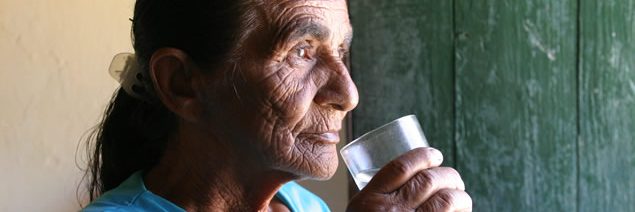Pará State, in the Baixo Tocantins region, Brazil
In collaboration with

December 2011 – September 2013
Provide less exposure to water contamination to reduce the incidence of diseases caused by faecal coliforms.
Objectives
- Improving water quality through the dissemination of simple technologies for sterilization, the distribution of test kits and the sterilization of equipment.
- Reduction in the incidence of diseases caused by fecal coliforms.
- Raise families‘ awareness about personal hygiene.
- Improving the quality of agricultural production.
Beneficiaries
24,000 direct

On the ground
There is almost a total absence of sewage services and drinking water systems. The water is poured into cesspools or open canals alongside the houses. In rural areas, there is no garbage collection system.
The rural territory of Baixo Tocantins consists of 11 municipalities:
- Abaetetuba
- Acará
- Baião
- Barcarena
- Cametá
- Mocajuba
- Moju
- Igarapé Miri
- Limoeiro do Ajuru
- Oeiras do Pará
- Tailândia
The region is experiencing significant demographic changes; in 2007 it already had 655,955 inhabitants, 52.33% of which lived in rural areas.
Investments in infrastructure cannot keep up with the growth rate of the population.
Riverside communities, especially children, are affected by water-borne diseases carried by pathogens that are present in the water (especially faecal coliforms): infections, mainly in the eyes, and dysentery.
The lack of sewage systems means that domestic animals (especially pigs) ingest human faeces, making them carriers of serious illnesses, such as neurocysticercosis.
The main food products in the area may be contaminated with faecal coliforms, since they come into contact with the ground and water.
The problem of lack of hygiene, mainly caused by the lack of sewage systems and sanitary education affects income from activities such as farming and fishing, both directly and indirectly. On the one hand, the high incidence of gastrointestinal diseases reduces the availability and productivity of rural workers. On the other hand, not being able to ensure that produce is hygienic makes it impossible to obtain health certificates, which are required in order to access markets in other countries and other regions of Brazil.
In detail
The project is divided into different sections:
- Training courses on the use of water sterilization techniques.
- Distribution of 180 kits with a sterile clay filter, chlorine tablets and a handbook.
- Construction of 18 dry toilets.
- ºConstruction of 3 experimental water treatment and purification units for water collected from the rivers.
- Series of workshops on the importance of personal hygiene, food hygiene and the consumption of wild animal meat.
The project will also have the following impact on local public policy:
- Series of workshops on the operation of the main participatory spaces of public policies in the municipalities and the region.
- Promoting participation from cooperative representatives in the Territorial Council Baixo Tocantins, in order to make the issue of sanitation an investment priority for state and federal governments.
- • Decisions taken by the Territorial Council on investment priorities for local and state governments, not only in infrastructures, but also in training. Greater participation in this matter from organizations of producers will make it possible to put pressure on public authorities in order to increase the amount of resources invested in basic sanitation and access to drinking water in remote communities.

